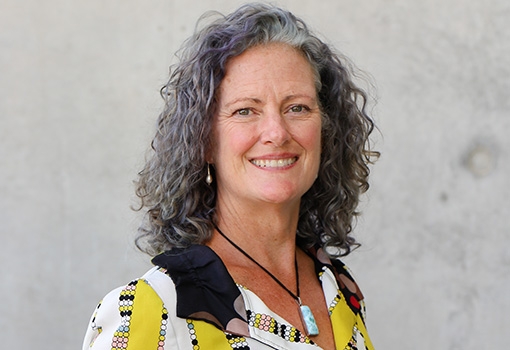UC Santa Barbara professor of mechanical engineering and chair of the Biological Engineering program, Beth Pruitt, has received one of five prestigious Boosting Research Ideas for Transformative and Equitable Advances in Engineering (BRITE) Fellow award given for 2023. BRITE Awards, says program director Siddiq Qidwai, give researchers unusual freedom to pursue ambitious research ideas.”
The National Science Foundation (NSF) awards, which provide from $100,000 to $200,000 per year, support experienced researchers in their efforts to forge new research directions or enter new fields. NSF describes the broader goal of the BRITE program, which is funded by the Division of Civil, Mechanical and Manufacturing Innovation (CMMI) as, “to expand knowledge and build capacity for a diverse science and engineering workforce.”
“The BRITE Fellow opportunity supports researchers who have a strong track record and a bold, unconventional vision that, if successful, could transform what’s possible and bring great benefits to the nation,” said CMMI Division Director Robert Stone. “NSF expects these BRITE Fellow projects to challenge established ideas, open new fields and create new paths through thorny problems.”
Applications for the awards are accepted in four tracks: the Synergy Track, the Pivot Track, the Relaunch track, or, in Pruitt’s case, the Fellow Track, the purpose of which is “to support established tenured or equivalent researchers who have demonstrated impact beyond scientific output to request extended time and freedom to use their intellectual creativity to explore divergent, bold, and ambitious research ideas where the expected scientific outcomes are highly uncertain and, therefore, high-risk.”
The award duration is two years for the Synergy Track awards, three years for the Pivot and Relaunch track awards, and five years for Fellow Track awards.
Pruitt, who focuses much of her research on mechanobiology, the study of the relationship between molecular events and mechanical forces in living systems, plans to use the award to advance the understanding of the different ways that male and female heart muscle cells handle stress. Recent studies have revealed significant differences in male and female biology in animal models and tissues, including in disease progression and responses to stress in the heart, both in whole organs and at the cellular level as well. Pruitt hopes that this work will reveal the extent to which these differences are intrinsic to the cell.
“The heart is the most mechanically stressed organ in our body,” Pruitt wrote in the abstract for her application. “Specialized heart muscle cells serve as the motor units driving each heartbeat to pump blood throughout our bodies. While it is known that the hearts of men and women vary in important details, such as size, heart rate, and protein composition, the fundamental mechanisms that cause these differences have not yet been identified.”
She adds that there exists a lack of diverse human heart cells for comprehensive studies, primarily because such cells do not renew after biopsy, injury, or disease.
“We are very excited for this project in the lab,” Pruitt said. “We have been studying the mechanobiology of stem cell–derived human cell models of heart muscle cells in a few cell lines all of which have the same genetic background and, thus, limited diversity. Excitingly, this project will allow us to expand our characterization in multiple male and female lines to support increased diversity in research using stem cell–derived models of human disease.”
During the five-year project, Pruitt plans to launch collaborations integrating engineering, biology, statistics, and computer science to develop new sources of human heart cells representing the diversity of society, and to validate the cells’ responses to stressors. Such a multidisciplinary approach, she suggests, will also support the development of a diverse workforce and create education and training opportunities to educate the next generation of researchers and science leaders.
Pruitt intends to develop and validate protocols for generating human heart muscle cells from induced stem cell lines obtained from diverse adult donors as a way to address the existing lack of models, human cell lines, and methods for linking cellular sex and mechanobiological stress responses. Pruitt played a key role in establishing the a stem cell bank of isogenic lines feom the Allen Institute for Cell Science in the Center for Stem Cell Biology & Engineering at UCSB.
Her approach in the project will be to induce mechanical and chemical stress and then observe the various ways that the cells respond, including how they change structure and function, and regulate key signaling proteins linked to physiological stress.
Additionally, the research is expected to provide new insights into muscle mechanobiology and how stress and sex cooperate to mediate cell maintenance and energy expenditures as a way of facilitating contractile function and cellular remodeling under stress.
This project will generate aligned multi-modal data (images, videos, sequences), experimental meta-data, and sufficiently aligned and annotated data sets across a range of male and female stem cell lines that, ultimately, will be suitable for machine learning approaches in the research community. The shared, publicly available data will benefit researchers working to develop cell and tissue engineering models and apply them to preclinical biomedical inquiry. In the longer term, communities and groups that are under-represented in current studies, such as women and racial minorities, will benefit from the inclusion of representative cellular data.

Professor Beth Pruitt, Chair Biological Engineering, UCSB.
